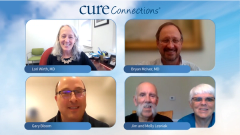
Receiving Lenvatinib Therapy for Iodine-Refractory DTC
Expert and patient perspectives on receiving lenvatinib therapy for iodine-refractory differentiated thyroid cancer.
Episodes in this series

Transcript:
Lori Wirth, MD: Let’s talk about treatment and treatment decisions. I want to talk a little about the SELECT trial. That study investigated lenvatinib compared with placebo in patients with iodine-refractory differentiated thyroid cancer that’s growing on scans. When we do that gene testing and we don’t find a RET fusion or an NTRK fusion, then our first choice of therapy is generally a multikinase inhibitor. For almost all my patients—and both lenvatinib and sorafenib are approved by the FDA in that setting—I use lenvatinib as my default first choice of therapy rather than sorafenib. We don’t have a head-to-head comparison between the two drugs, but the improvement in terms of responses and patients living longer in response compared with placebo was more robust in the lenvatinib trial, which is the SELECT trial, compared with the trial done with sorafenib, which is the DECISION trial. Basically, in the SELECT trial, we found that the overall response rate was 65%. What that means is that 65% of patients who got randomized to receive lenvatinib had a significant shrinkage of the tumor deposits that we can see on their scans. Beyond that, almost all patients had some tumor shrinkage. A very small number of patients enrolled on the trial didn’t have any tumor shrinkage at all. The tumor shrinkage has to be at least 30% by the definitions that we use in clinical trials to be considered a response. Beyond that 65%, most of the other patients treated with lenvatinib had at least some tumor shrinkage.
The other thing we know from the study is that this response can last for a long time. We can see patients remaining in response for many months or even for a number of years. It was on the basis of those very robust results that lenvatinib was approved by the FDA for treatment of iodine-refractory progressive differentiated thyroid cancer. One thing we found in the study is that even though it’s an oral drug, and it’s not an IV [intravenous] cancer drug, it still causes side effects. The most common side effects are high blood pressure, diarrhea, weight loss and fatigue, as well as less common side effects. When you think about high blood pressure, fatigue and diarrhea, it doesn’t really sound like such a big deal necessarily, but for many patients, that collection of side effects can be impactful over a long period of time. If you’re on these drugs day after day, week after week, month after month, the side effects can add up and take a toll. Jim, do you want to talk a little about what it’s been like for you to have side effects and how you’ve coped with side effects on treatment?
Jim Lesniak: Before I went on Lenvima [lenvatinib], I was on one blood pressure medicine and one cholesterol, simvastatin. After being on Lenvima, I started getting chest pains, so I narrowed it down to one of the two drugs I was on. I decided to get rid of the cholesterol one and see what happened. My chest pains went away, but when I went back on the simvastatin, my chest pains came back. I said, “It looks like I’m off the simvastatin.” A couple of months later, my blood pressure started to rise, and we went on another blood pressure medicine. Then the diarrhea started, probably within six months. Dr Wirth sent me to a nutritionist to tell me what I can and can’t eat. If it’s good for you, don’t eat it. If it’s white, then eat it, like white rice, white breads. That controls it pretty well. Fruits and vegetables, forget it. About a year and a half ago, I got diarrhea pretty bad when we were here in South Carolina, and I lost 50 pounds over the winter. We got the medication under control. Knock on wood, I’ve been good for almost two years. In terms of side effects, the diarrhea will still come and go, but it’s not that bad. A lot of that is self-induced. I want to have a salad. I know I’m going to pay for it the next day, but it’s a trade-off that’s worth it if you know what’s causing it. Other than that, knock on wood, I haven’t had too many side effects.
Molly Lesniak: You get tired.
Jim Lesniak: I get tired. I take a nap in the morning. I’ll take one in afternoon, a 15- to 20-minute nap. Last year my older brother and I built a deck for my sister, another deck for my daughter and a shed for him. I’ve got the energy. As I said, I try not to think about it.
Lori Wirth, MD: I’m going to put in a work order for my house. Molly, what do you think? Often our patients don’t want to bring their partners into clinic because their partners will tell on them.
Molly Lesniak: Pretty much. I try to go to most of his appointments. With COVID-19, it got to be where I could walk around the hospital, but I couldn’t go in with him. Most of the time, he’s pretty honest about how he feels. Of course, I’m always writing everything down. When he first goes in to check his weight, they’ll ask him how his fatigue is. He’ll say, “It’s OK,” and I’ll say, “No, you get tired easily some days.” When his blood pressure was high, he was hemming and hawing, but I told him to call Dr Wirth. We did, and you took care of that. It’s the same with when his diarrhea was so bad that he passed out on me, and I had to call the ambulance and have him transported to the hospital because he was dehydrated. He’ll say he’s unsure, but I say, “We need to let them know.” For the most part, I just follow by him. If his stomach is bothering him, I make a pot of rice. That’s what he’ll eat for a day or two, then we’ll go from there.
Lori Wirth, MD: You two are an amazing team. Molly, you’re describing a hugely important role that you have as a partner in this with Jim and with us in the clinic. Also, this impacts your life as well.
Molly Lesniak: At times. If he’s not feeling up to it, then I’ve gotten to the point where if I want to go out and see some of our grandchildren, because they live at the other end of the state, and he doesn’t want to go, then I’m going by myself some days. That’s a big step for me because we’re usually together for everything.
Transcript edited for clarity.





